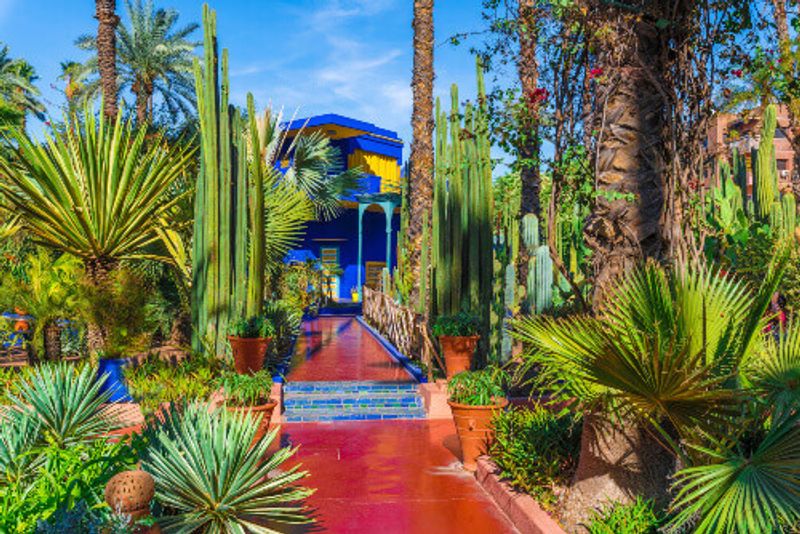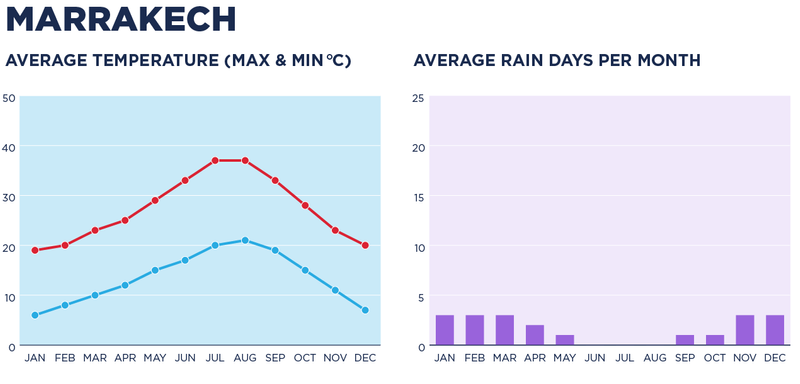Morocco is a place of dazzling diversity – from soaring mountain ranges to the sweeping desert and ancient cities. But, when is the best time to go?
Morocco captivates travellers with its colour, culture and warm hospitality. Bustling cities and souks, mouth-watering food, traditional riads, desert camel treks – your senses will be truly overloaded.
This North African country enjoys four distinct seasons, each bringing something sensational for visitors. With the extremes of the High Atlas Mountains, the broad, golden desert and miles of stunning coastline, the weather can be as diverse as the landscape, but there is always something to enjoy.
Spring is often regarded as one of the most pleasant times to visit Morocco. From March to May, the weather warms and temperatures around the country are ideal for exploring. In Marrakech, spring weather is beautiful and warm, without the sizzling heat of summer. With average temperatures of 26 degrees celsius, you can explore the souks and people-watch from the cafes in comfort.
The Moroccan coastline enjoys a moderate climate year-round; Essaouira and Casablanca are warm and sunny in Spring, with average temperatures in the twenties. Fes is also warm and sunny, with averages in the low twenties that warm-up towards summer.
In the Sahara, spring weather starts turning from warm to hot. Visit Merzouga at this time to enjoy some of the world’s most iconic sand dunes in a balmy 29 degrees. Spring in the Atlas Mountains can be beautiful, too, with warmer days and blooming wildflowers.
Summer is when most of Morocco turns up the heat, and the desert basks in the sun.
Marrakech’s average temperature reaches 38 degrees celsius in July, but the main square really comes alive in the cooler evenings. Fes expects hot 36-degree days, and in the Sahara, Merzouga regularly reaches 43 degrees, but the dunes tend to cool at sunrise and sunset.
Summer is milder along the coast and perfect for enjoying the beaches. Essaouira averages a sunny 22 degrees celsius in July, and Casablanca hovers in the mid-to-high twenties.
In autumn, temperatures start to dip and are much more comfortable. The beaches aren't as busy, the desert cools, and the skies are clear.
Marrakech enjoys average autumn temperatures of 28 degrees celsius in October, and Fes’s incredible old town can be comfortably explored in 26 degrees. Merzouga and the Erg Chebbi dunes cool down to 29 degrees during the day, perfect for camel trekking, while on the coast, Essaouira remains pleasant at 22 degrees.
Winter can bring chilly conditions you may not expect from Morocco, with regular snowfall in the mountains. The deserts are still warm during the day, at around 18 degrees celsius, but temperatures drop dramatically during the night. Marrakech also averages around 18 degrees during the day, making winter one of the best times to wander the medina and Majorelle Gardens without the tourist crowds.
Fes’s bright colours and ancient culture is also ideal to explore, at a mild 16 degrees, and Essaouira is still sunny and warm in the high tens.
Whether you are a mountain, desert, beach or city lover, Morocco has the holiday and season to suit.
When will you go?
Where else do you want to visit?

